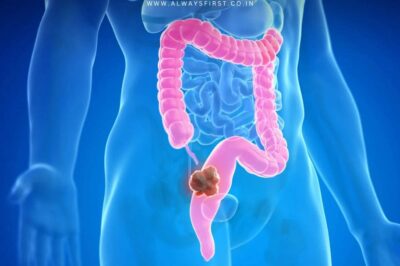In Shorts (Key Takeaways):
✔ Rising Trend: People born in 1990 have twice the risk of colon cancer vs. those born in 1950.
✔ Warning Signs: Rectal bleeding, persistent abdominal pain, fatigue, bowel changes, and unexplained weight loss.
✔ Urgent Action Needed: Experts urge early screening for young adults with symptoms or family history.

Colon Cancer Crisis: Why Younger Adults Are Now at Higher Risk
For decades, colon cancer was primarily associated with older adults. But a disturbing new trend is emerging: millennials and younger adults are being diagnosed at unprecedented rates. A study published in BJS found that individuals born in 1990 have double the risk of developing colon cancer compared to those born in 1950.
5 Warning Signs Young Adults Should Never Ignore
- Rectal Bleeding
- Blood in stool or on toilet paper (bright or dark red) should never be brushed off as “just hemorrhoids.” While benign causes exist, persistent bleeding warrants immediate medical evaluation.
- Unexplained Abdominal Pain
- Persistent cramping, bloating, or discomfort that doesn’t improve with diet or lifestyle changes could signal colon cancer. “Don’t assume it’s just stress or indigestion,” says Dr. Salhab.
- Fatigue That Won’t Quit
- Constant exhaustion, even after adequate rest, may indicate internal blood loss or cancer-related fatigue—a symptom often overlooked by busy young adults.
- Bowel Habit Changes
- Drastic shifts (diarrhea, constipation, or frequency) lasting more than a few weeks are a major red flag. “Your gut is telling you something’s wrong,” Dr. Salhab emphasizes.
- Mysterious Weight Loss & Other Symptoms
- Sudden weight loss, loss of appetite, night sweats, or recurring low-grade fevers may seem unrelated but could point to cancer when combined with other signs.
Why Is This Happening? Experts Weigh In
Researchers like Sara Char, lead author of the BJS study, attribute the rise to:
- Lifestyle factors: Poor diets (processed foods, low fiber), sedentary habits, and obesity.
- Genetic predispositions: Family history increases risk, but many cases have no clear hereditary link.
- Delayed screenings: Routine colonoscopies start at 45+, leaving younger adults undiagnosed until advanced stages.
The Bottom Line: Act Early, Save Lives
Health experts worldwide are calling for greater awareness and proactive healthcare discussions, especially for those with symptoms or a family history of cancer. “Don’t wait for symptoms to worsen,” urges Dr. Salhab. Early intervention drastically improves survival rates.
If you or someone you know experiences these warning signs, consult a doctor immediately. Colon cancer is beatable—but only if caught in time.








































Leave a Reply